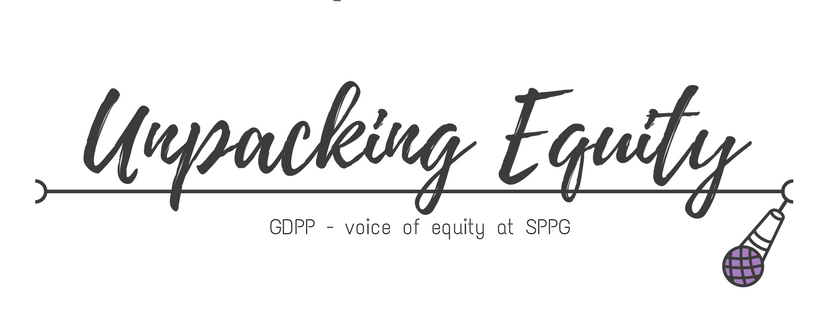 Unpacking Equity is a collaboration between the Public Policy and Governance Review and the Gender, Diversity and Public Policy Initiative (GDPP) at the School of Public Policy and Governance. This series aims to explain equity-related policy issues and break down complicated topics involving equity, diversity and inclusion. Policy professionals can gain a better understanding of these complex issues in order to incorporate an equity lens into their practice. To learn more, please get in touch with the GDPP.
Unpacking Equity is a collaboration between the Public Policy and Governance Review and the Gender, Diversity and Public Policy Initiative (GDPP) at the School of Public Policy and Governance. This series aims to explain equity-related policy issues and break down complicated topics involving equity, diversity and inclusion. Policy professionals can gain a better understanding of these complex issues in order to incorporate an equity lens into their practice. To learn more, please get in touch with the GDPP.
—
Harpreet Sahota
Equality is giving everyone a shoe. Equity is giving everyone a shoe that fits.
– Naheed Dosani
We often use the terms equality and equity interchangeably, and while they are related, they are not at all the same. The difference is critical to understanding how conversations about equality can lack inclusivity and disregard issues of fairness. For instance, consider recent discussions about the policing of black lives and the rise of the Black Lives Matter movement. The problem with the debate is that many folks have conflated equality and equity by claiming that the slogan should be changed to “All Lives Matter,” with the idea that under the rule of law, all people deserve security of the person and justice. Of course this is true. But to focus on “equality” takes the spotlight away from the Black community, a historically marginalized group that faces additional barriers to accessing justice. Emphasizing the significance of Black lives is crucial to acknowledging how Black people have not been treated equally under “the law” and in the criminal justice system.
Equality is defined by the Merriam-Webster dictionary as “the quality or state of being equal,” or “likeness or sameness in quality, power, status, or degree” in legal terms. Policies that prioritize equality aim to ensure that everyone enjoys the same things; essentially, it means that we treat everyone the same. Equity, though closely related, is primarily concerned with “justice according to natural law or right; specifically, freedom from bias or favouritism.”
To put it simply, equality promotes sameness, while equity promotes fairness.
To put it simply, equality promotes sameness, while equity promotes fairness. Rather than everyone being given the same thing, prioritizing fairness means everyone should be given what they need to be successful (and that success may be defined differently for different people). If we claim that everyone ought to receive the same things, we are assuming that everyone is starting from the same place, which is simply not true. Because individual needs differ, so do the demands to fulfill those needs. Simply aiming for equality without accounting for disparities in equity actually makes individuals less equal relative to each other, since it means ignoring historical context and individual differences affecting access to opportunities for success.
Inequity is caused by differences in access to opportunities; it is not the product of any inherent differences between individuals. Consider, for example, the Canadian health care system. Health care is (mostly) free for all citizens, but not everyone has the same access to these services. Factors such as place of residence, sexual orientation and gender can act as barriers to care, meaning the system, while equal, is not equitable.
A 2016 Public Health Review indicated that Indigenous children on reserves lack access to basic treatment and medical services largely due to a lack of funding and poor infrastructure. The lack of equality in care (among other things) for Indigenous peoples does not take into account the historical context that emphasizes the severity of the need for care. People living without access to adequate care are not responsible for their misfortune and they do not seek special treatment; rather, they hope to reduce the systemic barriers that create opportunity gaps, which limit equitable access to healthcare.
Aiming for equity rather than equality is an attempt to address the oppression of people who belong to marginalized communities. However, when people leading privileged lives have to lose some entitlement for the sake of greater equity, they may feel like they are being treated unfairly, which can make it difficult for equity-seekers to win the support of those with significantly more power and resources.
Designing and implementing policies that will achieve equitable outcomes is challenging, but we cannot claim that existing policies promote equality if they simultaneously disadvantage marginalized groups of people. Our focus must be on equity as the essential means for achieving equality.
—
Harpreet Sahota is a second year MPP candidate at the University of Toronto’s School of Public Policy and Governance. She holds a Bachelor of Administrative Studies with Specialized Honours in Management from York University. She is passionate about social policy and her interests include diversity and anti-racism, equity and mental health awareness. When she is not in the library, she enjoys being outdoors or eating a plethora of bananas. She is currently on exchange in Berlin studying at the Hertie School of Governance.

3 Comments
Comments are closed.